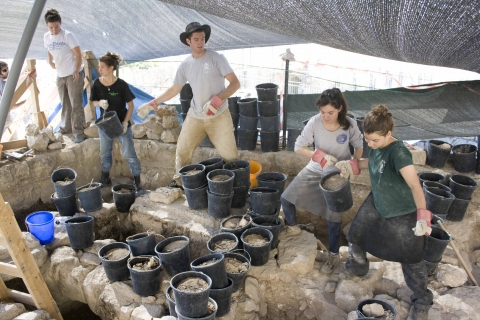Exposing the First Temple Period
Once excavators reach remains from the First Temple Period, all the dirt is carefully dry sifted and then wet sifted. In Area A several floor layers also emerged in November.
Once excavators reach remains from the First Temple Period, all the dirt is carefully dry sifted and then wet sifted. In Area A several floor layers also emerged in November.

All of our photos from October have now been added to the galleries!
Check out our latest photos in:
Dig volunteers demonstrate the process of dry sifting and talk about what it’s like to work on the dig. At the end of October, workers in Area A uncovered a scarab beetle from the 10th Century, B.C.E. The scarab was used to seal letters and is of Egyptian design. Dr. Eilat Mazar theorizes, “We know King Solomon married an Egyptian princess. Was it hers?”
Two mikvah purification baths located next each other in Area B were cleared off in October, along with a third that was discovered in Area A. Another especially large bath located on the site is 10 by 10 meters. It is the only purification bath known of that is above ground.
We are several weeks into the dig now and I am already well versed in the art of swinging a pick, scraping, brushing and, of course, participating in the bucket lines. Where I find more difficulty is in the area of communication. While most of the workers on the site can speak English, the Israelis all prefer to speak Hebrew in casual conversations with each other. When that happens, I listen to the flurry of conversation going back and forth and try to pick out the occasional word. With the help of Pimsleur Hebrew lessons, a course that all the Herbert W. Armstrong College dig volunteers are taking, I can understand the most basic of sentences.
Often as the Hebrew conversations continue back and forth, I stand bewildered to the side until they ask me something. This is it: the culmination of weeks of Hebrew training are about to be wielded with all the skill I can muster. I promptly stutter out, “Ani lo mevin.” (I do not understand.) That is one sentence I can use on a regular basis.
I know, I know. I have a long way to go before I will be able to converse with the Jews in their native dialect, but thankfully, they are patient with me and seem to know English far better than I know Hebrew. One man on the dig told me that he came to the dig with the intention of learning better English. So the conversation is not completely stagnant. The Israelis are happy to teach me Hebrew words, and I can lend my knowledge of the English language to them.
In fact, the Jewish people are delighted to hear that the international workers are attempting to learn Hebrew. They are quick to lend a hand with the odd word or phrase that will help bridge the language gap. They will correct a misspoken word, and compliment a well-used Hebrew term with a congratulatory, “Tov me’od!” (Very good!)
Sometimes, there is a word that just cannot be communicated between the two languages, and a more creative means must be used to convey information. One such instance was when a man was trying to ask me where he could find some tin. He did not know the English word for tin, so a lengthy dialogue ensued involving a number of people, culminating in them singing a song from “The Wonderful Wizard of Oz.” From this brief musical exchange, we were able to make a link to the tin man and from there, to tin.
So, language will continue to be something that we will work to overcome while we finish out our stay in Israel. There are a few hurdles to face—but with perseverance, even a lo kolkach tov (not so good) understanding of the language now can eventually turn into a yofi (great) mastering of Ivrit (Hebrew).
Until next time, Shalom!